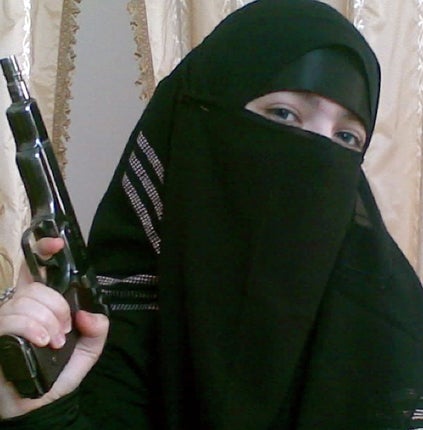Suicide bomber 'widow of terrorist leader'
Russia says seventeen-year-old was one of 'black widows' who attacked Moscow metro

The soft facial features peeking out from behind a black Muslim headscarf are those of a child; almost cherub-like. But it is this 17-year-old girl who has been named by Russian authorities as one of the two "Black Widow" suicide bombers who caused carnage this week on Moscow's underground.
Her name is Dzhennet Abdurakhmanova. In a photo of her obtained by the Russian press, taken at an unknown time and unknown location, her innocent face is belied by the gun she holds in her hand. She is pictured with her husband. He has been named as Umalat Magomedov, a terrorist leader thought to have been killed by Russian forces last December. Wearing a checked shirt and jeans, he too carries a gun.
It is believed that Abdurakhmanova blew herself up at Lubyanka metro station on Monday morning, killing more than 20 people. Forty minutes later, another bomber hit further down the same metro line, at Park Kultury. The two bombings were the first terrorist attacks in the Russian capital for six years. A 51-year-old man who had been injured in one of the blasts died in a Moscow hospital yesterday, taking the death toll to 40.
Abdurakhmanova is said to be from Kostek, a small village in Dagestan, the restive, mountainous region that borders Chechnya in Russia's south. A Russian radio station tracked down an official from her home village who gave an insight into the early life of the future terrorist.
Aida Aliyeva, the deputy head of the town's administration, remembered Abdurakhmanova as a "quiet and calm" girl. "She lived here until 2005, and studied in school from the first to the sixth grade," Ms Aliyeva said.
Then, the family moved to Khasavyurt, the regional centre. Her mother was often ill, did not have a steady job, and had to raise her two daughters alone, without a husband. "I was told that she used to read poems about her mother at school events," Ms Aliyeva said. "She read poems beautifully."
Little is known of how Abdurakhmanova became involved in the underground terrorist movement in the Caucasus. It is believed that she met her future husband, one of the leading fighters in the Dagestan underground, over the internet when she was just 16.
Previous reports have suggested that the two Moscow bombers may have been part of a cell of up to 30 women who underwent training for suicide attacks in Turkey and were "handled" by Said Buryatsky, a top figurehead in the Caucasus terrorist movement who was killed by Russian forces last month.
In a video message, Doku Umarov, self-styled Emir of the Caucasus Emirate and the most-wanted terrorist in Russia, said the attacks were carried out on his orders, and promised more strikes against Russia would follow.
On Tuesday, the day after the carnage in Moscow, another two suicide attacks took place in Kizlyar, a dusty Dagestan town close to the border with Chechnya. Twelve people, including the town's chief of police, were killed.
The Moscow bombers and their accomplices are thought to have travelled to the capital on a bus from a town in the North Caucasus, possibly Kizlyar. Frequent buses run along the bumpy, long routes to Moscow, and are mainly used by shuttle traders, because they are cheaper than the train. They would also be better suited to terrorists, as unlike domestic trains, passengers do not have to show their passports to buy tickets.
Russia's National Anti-Terrorism Committee yesterday afternoon confirmed media reports that Abdurakhmanova was one of the suicide bombers. Several Russian officials have indicated that the organisers of the attack are also known, but no other names have been made public, as the investigation is ongoing.
Unconfirmed reports named the second "Black Widow" bomber as a 20-year-old Chechen woman who had also been married to a slain terrorist leader. Alexander Bortnikov, the head of Russia's FSB security service, has said that several arrests have already been made.
Both Russian President Dmitry Medvedev and Prime Minister Vladimir Putin have had tough words since the attack. Mr Putin promised that terrorists would be "scraped from the sewers". Mr Medvedev, after initially focussing more on the socio-economic causes of terrorism, has taken a harder line as the week has worn on.
Yesterday he demanded that those who helped terrorists be punished. "We have to create such a model for terrorist crimes that anyone who helps them – no matter what he does, be it cook the soup or wash the clothes – has committed a crime," Mr Medvedev said.
Join our commenting forum
Join thought-provoking conversations, follow other Independent readers and see their replies
Comments
Bookmark popover
Removed from bookmarks